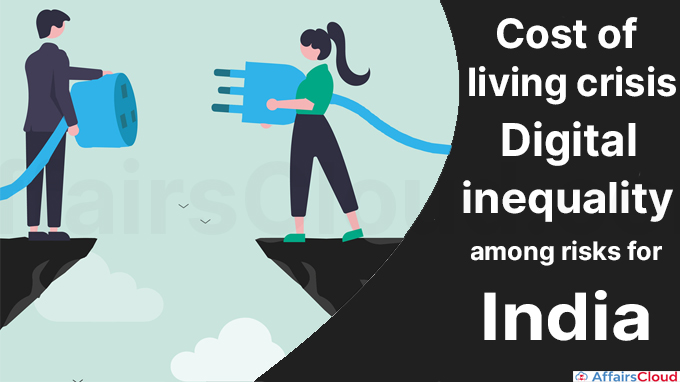The 
- These risks include cost-of-living crisis, digital inequality, geopolitical competition for resources, natural disasters, and extreme weather events.
The Global Risks Report 2023 summarises the findings of the latest Global Risks Perception Survey (GRPS).
Key Report Findings:
i.Globally, the greatest risks over the next 2 years [2023–2025] include: cost-of-living crisis, natural disasters and extreme weather conditions, geoeconomic confrontations, failure to control climate change, and occurrences causing significant environmental damage.
- Over the next 2 years, “cost of living crisis” is projected to be the most serious global concern, with a short-term peak.
ii.The biggest risks over the long term (10 years) [2023-2033] are failures to adapt to and mitigate climate change, loss of biodiversity, massive involuntary migration, and natural resource crises, among others.
- Environmental and social crises, fuelled by underlying geopolitical and economic trends, will dominate the next 10 years.
iii.The two global risks that are expected to deteriorate the fastest over the next 10 years are “biodiversity loss and ecosystem collapse.”
- Beyond the short term, climate change is the most serious threat to the global economy, and it is the one to which humanity is least prepared.
- Nature loss and climate change are closely intertwined —a failure in one will make an impact in the other.
iv.The COVID-19 pandemic and the European war have brought the energy, inflation, food, and security concerns back to the spotlight, and together these threats are shaping the next 10 years in a unique, uncertain, and turbulent manner.
- The economic impacts of COVID-19 and the war in Ukraine have resulted in a period of high inflation, rapid monetary policy normalisation, and low growth & low investment.
Top 10 Global Risks Ranked by Severity Over the Short & Long Term: Global Risks Report 2023
| # | Short Term (2 Years) | Long Term (10 Years) |
|---|---|---|
| 1 | Cost of Living Crisis | Failure to Mitigate Climate Change |
| 2 | Natural Disasters & Extreme Weather Events | Failure of Climate Change Adaptation |
| 3 | Geoeconomic Confrontation | Natural Disasters & Extreme Weather Events |
| 4 | Failure to Mitigate Climate Change | Biodiversity Loss & Ecosystem Collapse |
| 5 | Erosion of social cohesion and Societal Polarization | Large-scale Involuntary Migration |
| 6 | Large-scale Environmental Damage incidents | Natural Resources Crises |
| 7 | Failure of Climate Change Adaptation | Erosion of social cohesion and Societal Polarization |
| 8 | Widespread Cybercrime and cyber insecurity | Widespread Cybercrime and cyber insecurity |
| 9 | Natural Resources Crises | Geoeconomic Confrontation |
| 10 | Large-scale Involuntary Migration | Large-scale Environmental Damage incidents |
Recent Related News:
In November 2022, the Toolbox of Solutions for Urban Decarbonization was introduced at COP27 by the World Economic Forum (WEF) in collaboration with four prominent organizations.
The four organizations are the National Institute of Urban Affairs (NIUA), Sustainable Energy for All (SEforALL), the Basel Agency for Sustainable Energy (BASE), and the Electric Power Research Institute (EPRI).
About the World Economic Forum (WEF):
The WEF is the International Organization for Public-Private Cooperation.
Founder & Executive Chairman – Professor Klaus Schwab
Managing Director (MD) – Saadia Zahidi
Established – 1971
Headquarters – Cologny, GenevaCanton, Switzerland